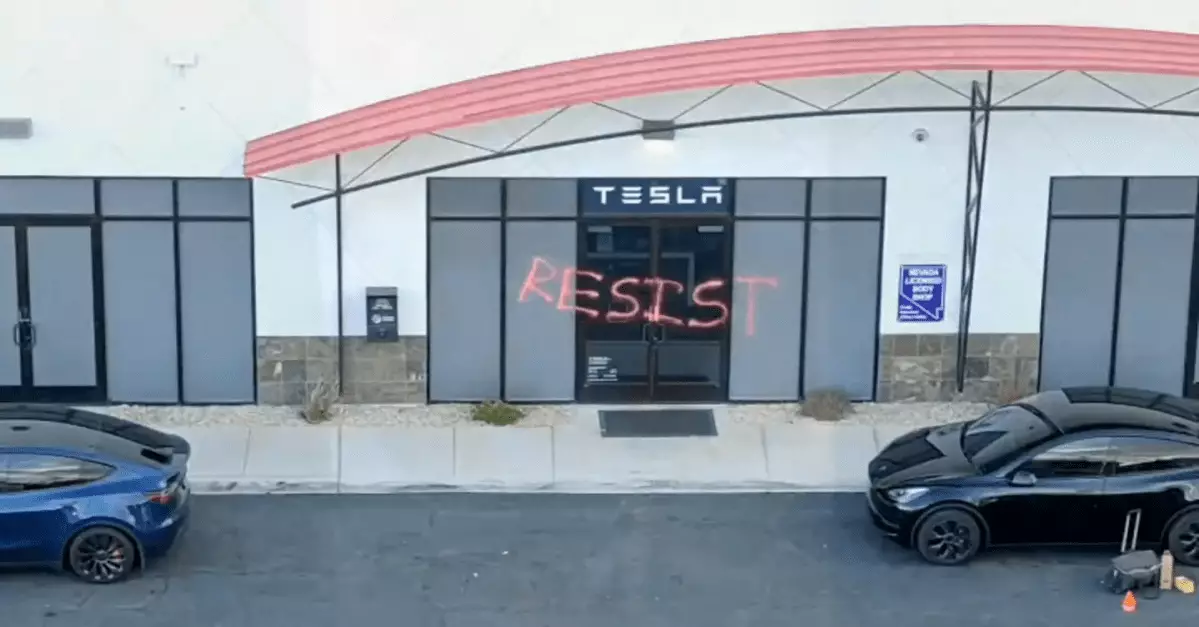In a shocking turn of events, the threat against electric vehicle manufacturers, particularly Tesla, has escalated into a deliberate and alarming pattern of vandalism that some are now labeling as domestic terrorism. The recent spate of incidents—including Molotov cocktails hurled at Teslas in Las Vegas and a Cybertruck setting ablaze in Kansas City—raises pressing questions about motivations and the growing anti-EV sentiment manifesting across the nation. The implications of categorizing such acts as domestic terrorism not only highlight the intense emotions surrounding the electric vehicle movement but also shed light on the potential for violence against the industry as it gains traction.
The Infamous Las Vegas Incident
The Las Vegas debacle serves as the most egregious example of this distressing trend. Early one Tuesday morning, an assailant dressed in black ruthlessly targeted vehicles at a Tesla collision center, deploying incendiary devices and firearms. This wasn’t merely an episode of vandalism; it was a calculated attack on a symbol of innovation and sustainability. Deputy Fire Chief Jennifer Wyatt revealed that firefighters managed to avert a catastrophic situation before the EV batteries ignited in a fiery explosion, a routine aspect of these vehicles that can quickly become dangerous when tampered with.
FBI Special Agent Spencer Evans, indicating the seriousness of the situation, stated that this incident has now been escalated to the FBI’s joint terrorism task force. This is a pivotal move, underlining the narrative that these acts of violence are no longer isolated incidents but part of a troubling trend that targets electric vehicles. Tesla CEO Elon Musk aptly described the attacks as “terrorism,” likening the operations against Tesla to political warfare against beneficial innovations in the automotive industry.
The Broader Context of Anti-Tesla Sentiment
Adding another layer to this unfolding drama is the increasing pushback against electric vehicles as they disrupt long-standing norms in the automotive space and challenge industries built around fossil fuels. The events in Kansas City, where a police officer encountered flames engulfing a parked Cybertruck, further illustrate how this hostility towards Tesla isn’t confined to just one region but is radiating outward, suggesting a burgeoning movement against these vehicles and what they represent.
This pivot towards violence against Tesla has sparked conversations about the broader implications of environmental activism, where fierce opposition can emerge within communities long resistant to changes in the automotive landscape. Critics may argue that such methods undermine genuine discourse on climate change and sustainable practices, reducing complex discussions to fear-fueled aggression.
The Motivations Behind Destruction
What lies at the heart of this violence? Is it rooted in a mere dissatisfaction with electric vehicles or a more profound fear of change, driven by cultural, economic, or personal beliefs? The mention of the word “resist” graffiti-painted on the Las Vegas collision center indicates an ideological battle being fought—the struggle between the status quo and progressive transformation.
As electric vehicles are positioned as a central component in the fight against climate change and environmental degradation, the backlash suggests a clash of old versus new values. It poses questions about societal readiness to embrace transformative technologies, highlighting not just economic concerns but deep-seated psychological resistance to change.
The wave of violence against Tesla captures a critical moment in our history, where technological advancements are met with both enthusiasm and hostility. As this dichotomy plays out, it serves as a reminder that the revolution toward sustainability comes with its challenges—challenges that may require more than just innovation but a profound re-examination of societal values, beliefs, and willingness to adapt.


Leave a Reply
You must be logged in to post a comment.